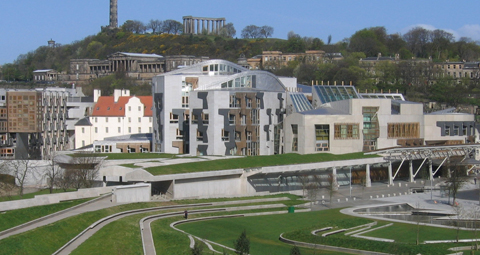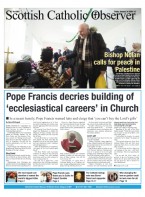BY Daniel Harkins | March 22 | ![]() 0 COMMENTS
0 COMMENTS ![]() print
print

Church rejects proposed ‘sectarianism’ legislation
Unnecessary’ hate crime proposals that are currently being considered by the government could undermine relations between different Christian denominations in Scotland, the Church has said.
In its response to the Scottish Government consultation on hate crime legislation, the Church opposed proposals for a new ‘sectarianism’ aggravation for hate crime attacks.
The proposals were made by a much-criticised working group that was set-up by the government to define sectarianism in law.
Current hate crime legislation allows any existing offence to be aggravated by prejudice in respect of one or more of the protected characteristics of race, religion, disability, sexual orientation and transgender identity.
Criticism
The consultation is considering a proposal by the working group on sectarianism to introduce ‘a new statutory aggravation of sectarian prejudice/hostility.’
The working group was established last year and has been heavily criticised since its inception.
The SCO revealed in April that it had no representative of the Catholic community, despite Catholics making up more than half of all victims of hate crime in Scotland, and despite two Church of Scotland minsters sitting on the panel.
It was also criticised by the Catholic Church and cross-party MSPs for including among its members a law academic who once mocked clergy as ‘actors in fancy dress.’
The government ignored continual calls from the Catholic community, Church and opposition MPS to include a Catholic representative on the working group.
Rejection
The Church has now rejected the groups’ recommendations.
‘Existing legislation, including existing statutory aggravations’ is adequate, the Church said in its response to the consultation.
“We oppose any move to shift existing protections to an unnecessary sectarianism aggravation. We agree with Lord Bracadale that the absence of such an aggravation would not leave a gap in the law as both race and religion statutory aggravations can be attached to any base offence if proven,” it said.
“Christian communities in Scotland enjoy a positive ecumenical relationship and we are concerned that government is proposing unnecessary legislation that undermines the development of community relations between Christian denominations.
“The proposed aggravation assumes that where anti-Catholic, anti-Protestant, anti-Irish or anti-British bigotry or racism occurs, those responsible are from another Christian denomination or Irish/British ethnicity.
“The existing aggravations of religious and racial hate crime are adequate and the Scottish Government should seriously consider maintaining the protection of these characteristics and integrate them into a consolidated piece of hate crime legislation.”
The Church also proposed the establishment of ‘proper empirical research and recording’ of hate crime to ‘build an accurate picture of offending behaviour, using police and Crown Office data.’
The working group’s suggestions have also been rejected by the Call it Out group which campaigns against anti-Catholic bigotry and anti-Irish racism.










